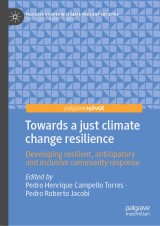Details

Towards a just climate change resilience
Developing resilient, anticipatory and inclusive community responsePalgrave Studies in Climate Resilient Societies
|
69,54 € |
|
| Verlag: | Palgrave Macmillan |
| Format: | |
| Veröffentl.: | 27.11.2021 |
| ISBN/EAN: | 9783030816223 |
| Sprache: | englisch |
| Anzahl Seiten: | 117 |
Dieses eBook enthält ein Wasserzeichen.
Beschreibungen
<p>This book provides an accessible overview of how efforts to combat climate change and social inequalities should be tackled simultaneously. In the context of the climate emergency, the impacts of extreme events can already be felt around the world. The book centres on five case studies from the Global South, Latin America, Pacific Islands, Africa, and Asia with each one focused on climate justice, resilience, and community responses towards a just transition. The book will be an invaluable reference for advanced undergraduates and postgraduate students, researchers, policymakers, and practitioners in environmental studies, urban planning, geography, social science, international development, and disciplines that focus on the social dimensions of climate change.<br></p>
Introduction - Community practices and climate justice. A global south perspective in the face of climate emergency.- Building small-scale fishers’ adaptive capacity through participatory action research in coastal Uruguay.- Ensuring Water Security for Climate Vulnerable Communities in Coastal Bangladesh.- Policy and Planning Responses to Climate Change in Solomon Islands: A Place for Forest-based Carbon Offset Initiatives in Building Just and Resilient Territories?.- Just adaptation to protect human capabilities: analysis and recommendations for Northern Mozambique.- Climate Injustice in Brazil: what are we failing towards a just transition in a climate emergency scenario?.- Community practices and climate justice from the Global South – Synthesis and Ways Forward.<br>
<div><p><b>Pedro Henrique Campello Torres </b>is a Researcher at the Institute of Energy and Environment, University of São Paulo, Brazil. He is currently a Research Fellow of the Earth System Project and IPCC Expert Review. His research focuses on climate change inequalities, climate and environmental justice with a particular emphasis on urban planning, decoloniality and participatory approaches.</p><p> </p><p><b>Pedro Roberto Jacobi </b>is Full Professor in Institute of Energy and Environment, and coordinates the Environment and Society working group at the Institute of Advanced Studies, University of São Paulo, Brazil. Professor Jacobi is currently President of the Board of ICLEI South America and integrates the Advisory Board of the South American Institute for Resilience and Sustainability Studies. His research centres on social learning and environmental governance focusing on issues related to water and solid waste management.</p></div>
<p>“This collection of studies fills a glaring gap in research on climate justice in that richly diverse social-ecological landscape that has come to be called the Global South. While acknowledging the stark and inequitable realities of climate vulnerability across countries in Southeast Asia, Africa and Latin America, the authors nonetheless highlight the tremendous capacities for agency among local communities, organizations, and peoples.”</p><p></p><p>— <b>Debra J. Davidson</b>, Professor, Environmental Sociology, Department of Resource Economics and Environmental Sociology, University of Alberta, Canada.</p><p> </p>This book provides an accessible overview of how efforts to combat climate change and social inequalities should be tackled simultaneously. In the context of the climate emergency, the impacts of extreme events can already be felt around the world. The book centres on five case studies from the Global South, Latin America, Pacific Islands, Africa, and Asia with eachone focused on climate justice, resilience, and community responses towards a just transition. The book will be an invaluable reference for advanced undergraduates and postgraduate students, researchers, policymakers, and practitioners in environmental studies, urban planning, geography, social science, international development, and disciplines that focus on the social dimensions of climate change.<p></p><p></p><p> </p><p><b>Pedro Henrique Campello Torres </b>is a Researcher at the Institute of Energy and Environment, University of São Paulo, Brazil. He is currently a Research Fellow of the Earth System Project and IPCC Expert Review. His research focuses on climate change inequalities, climate and environmental justice with a particular emphasis on urban planning, decoloniality and participatory approaches. </p><p> </p><p><b>Pedro Roberto Jacobi </b>is Full Professor in Institute of Energy and Environment, and coordinates the Environment and Society working group at the Institute of Advanced Studies, University of São Paulo, Brazil. Professor Jacobi is currently President of the Board of ICLEI South America and integrates the Advisory Board of the South American Institute for Resilience and Sustainability Studies. His research centres on social learning and environmental governance focusing on issues related to water and solid waste management.</p><p></p><p></p>
Includes five practical case studies focused on the science-policy interface Focus on climate justice, resilience, and community responses towards a just transition Invaluable reference for researchers and practitioners looking for an accessible overview
“Climate Change emerges as the greatest threat of the civilisational crisis in which we find ourselves. The consequences for the planet have been dire, including the human species. Although we are talking about a global problem, not all have the same levels of responsibility for the most worrying manifestations of climate change. Hence the importance of demanding climate justice as well as addressing a transgression already close to the point of no return. This demands that priority be given to economic, social, ecological and territorial redress for those countries and local communities affected with less responsibility for climate disruption. “<p></p><p><b>--Antonio De Lisio</b>. Professor at Universidad Central de Venezuela, Venezuela.</p><p> </p>“This collection of studies fills a glaring gap in research on climate justice in that richly diverse social-ecological landscape that has come to be called the Global South. While acknowledging the stark and inequitable realities of climate vulnerability across countries in Southeast Asia, Africa and Latin America, the authors nonetheless highlight the tremendous capacities for agency among local communities, organizations, and peoples.”<p></p><p> --<b>Dr. Debra J. Davidson</b>, Professor, Environmental Sociology, Department of Resource Economics and Environmental Sociology,University of Alberta, Canada.</p><p> </p>
Diese Produkte könnten Sie auch interessieren:

Decision Support Systems for Risk-Based Management of Contaminated Sites

von: Antonio Marcomini, Glenn Walter Suter II, Andrea Critto

96,29 €

Dynamics of Mercury Pollution on Regional and Global Scales

von: Nicola Pirrone, Kathryn R. Mahaffey

149,79 €














